Taking care of your skin is more than just a beauty routine; it is a crucial component of your overall health and well-being. Healthy skin acts as a powerful barrier against environmental threats, helps regulate body temperature, and ensures vital functions like sensation, hydration, and nutrient storage. Neglecting skin care can lead to a range of issues, from premature aging and wrinkles to more severe problems like infections and diseases.
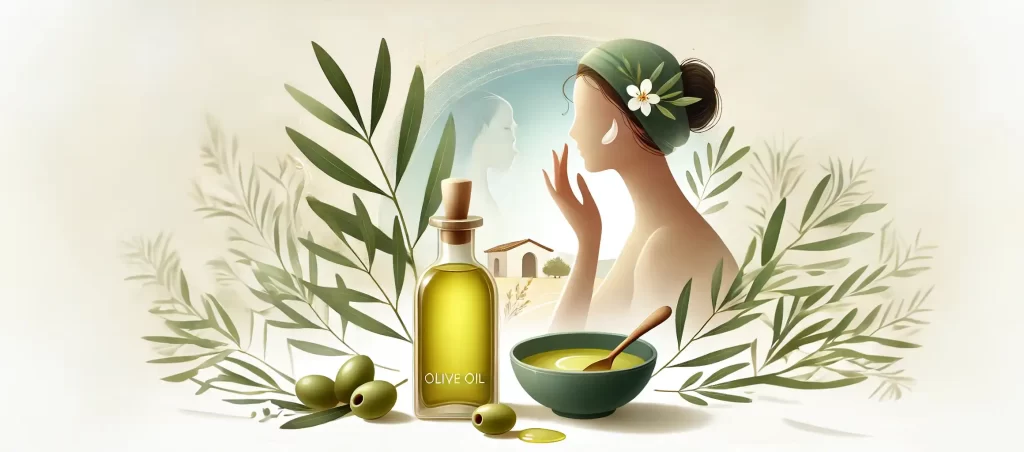
In the realm of skin care, natural remedies have gained immense popularity for their efficacy and minimal side effects. Among these, olive oil stands out as a miraculous ingredient. This natural oil, celebrated since ancient times, is rich in antioxidants, vitamins E and K, and essential fatty acids. These components make olive oil not only a heart-healthy dietary option but also a potent elixir for maintaining youthful, radiant skin.
Integrating olive oil into your skin care routine can rejuvenate your skin by deeply moisturizing, fighting oxidative damage, and enhancing skin elasticity. Its anti-inflammatory properties also make it ideal for soothing irritated skin and combating acne. Whether you are looking to revitalize your complexion or maintain its glow, olive oil can be your simple, natural solution to a healthier, more vibrant skin.
Understanding Your Skin Type
Knowing your skin type is a crucial step in optimizing your skin care routine to achieve the best results. Each skin type has unique characteristics and requires different care strategies. Here’s how to identify and cater to each type:
Dry Skin
Dry skin often feels tight and may flake or itch. It tends to have a dull appearance due to lack of moisture and is more prone to aging and irritations. To care for dry skin, look for products that are highly moisturizing. Ingredients like hyaluronic acid and glycerin are beneficial as they attract moisture. Cream-based cleansers and heavy moisturizers are recommended, and olive oil can be an effective natural moisturizer, providing deep hydration and protecting the skin barrier.
Oily Skin
Oily skin is characterized by a shiny complexion and larger, visible pores. This skin type is more susceptible to acne due to the overproduction of sebum. For oily skin, use water-based or gel-based skin care products that regulate oil production without over-drying. Lightweight moisturizers and foaming cleansers usually work best. Incorporating a gentle exfoliator can also help manage excess oil and keep pores clear.
Combination Skin
Combination skin features areas of both dry and oily skin, typically with oiliness in the T-zone (forehead, nose, and chin) and dryness on the cheeks. This type requires a balanced approach: hydrating creams for dry areas and lighter products for oily zones. Multi-masking, where different masks are applied to different areas of the face, can be particularly effective.
Sensitive Skin
Sensitive skin easily reacts to irritants, with symptoms like redness, itching, or rashes. It requires gentle care with hypoallergenic and fragrance-free products to avoid aggravation. Products with soothing ingredients like aloe vera or chamomile can be beneficial, and it’s essential to introduce new products gradually to monitor reactions.
Tailoring Your Skin Care Routine
Once you understand your skin type, you can tailor your skin care routine to match your specific needs. For instance, while olive oil is an excellent moisturizer for dry skin, those with oily skin might use it sparingly. Regular skin assessments are important as your skin type can change with factors like age, climate, and health.
The Science of Aging Skin
Aging skin is a natural process, but various factors can accelerate this change, impacting the appearance and health of your skin. Understanding these factors and how natural ingredients can mitigate them is crucial in maintaining youthful skin.
Factors Contributing to Skin Aging
- Sun Exposure: UV rays from the sun cause photoaging, characterized by wrinkles, reduced elasticity, and pigmentation changes. Sun damage is the primary environmental factor contributing to premature skin aging.
- Genetics: Your genes determine how quickly the aging process occurs, influencing changes in skin texture and structure.
- Environmental Pollutants: Exposure to pollutants and chemicals can accelerate aging by generating free radicals that damage skin cells.
- Lifestyle Choices: Smoking, poor diet, and insufficient sleep can exacerbate the aging process. These factors contribute to oxidative stress, which damages the skin at a cellular level.
- Hormonal Changes: As we age, hormonal levels fluctuate, leading to decreased skin elasticity and moisture.
Natural Ingredients in Anti-Aging
Natural ingredients play a pivotal role in slowing the aging process by providing essential nutrients and combating damage:
- Antioxidants: Ingredients like olive oil, green tea, and berries contain antioxidants that neutralize harmful free radicals. Regular application or consumption of these can reduce signs of aging and protect skin health.
- Vitamins: Vitamins C and E are vital for skin care. They promote collagen production and provide photoprotection. Natural oils, fruits, and vegetables are rich in these vitamins and are beneficial for aging skin.
- Omega Fatty Acids: Ingredients like olive oil are rich in omega fatty acids, which nourish the skin, improve elasticity, and maintain barrier function to prevent water loss.
- Natural Oils: Beyond olive oil, oils like jojoba and almond oil mimic the skin’s natural sebum, providing hydration and forming a protective barrier against environmental damage.
Incorporating these natural ingredients into your skin care routine can significantly delay the signs of aging, enhancing both the appearance and health of your skin.
Olive Oil in Skin Care
Olive oil, a staple in culinary traditions, also boasts a long history as a valuable skin care ingredient. Its beneficial properties for skin health are backed by both science and centuries of use in various cultures. Here’s how olive oil can be a game-changer for your skin care routine:
Properties of Olive Oil That Benefit the Skin
- Moisturizing: Olive oil contains squalene, a natural organic compound that mimics your skin’s natural sebum. This allows it to provide superior moisturization, which is particularly beneficial for dry skin types.
- Antioxidant Protection: Rich in antioxidants, including vitamins E and K, olive oil helps combat oxidative damage from environmental stressors like UV radiation and pollution. These antioxidants aid in skin repair and renewal, preventing premature aging.
- Anti-inflammatory: Thanks to its composition, olive oil has natural anti-inflammatory properties. It can help reduce redness and swelling, making it beneficial for conditions like eczema and psoriasis, as well as soothing sunburn.
- Enhancing Skin Elasticity: Olive oil’s antioxidants and vitamins improve skin elasticity, thereby reducing the appearance of wrinkles and enhancing skin’s overall youthful look.
Historical Uses of Olive Oil for Skin Health
Historically, olive oil has been used in Mediterranean and Middle Eastern cultures not only for dietary purposes but also as a beauty secret. Ancient Egyptians, Greeks, and Romans used olive oil for skin care in various ways:
- Cleansing: It was used as a base for cleansing the skin and removing makeup without stripping the skin’s natural oils.
- Moisturizing and Healing: Olive oil was commonly applied after baths to moisturize the skin, heal dry patches, and protect against harsh weather conditions.
- Anti-Aging: Recognized for its anti-aging properties, it was used in many regenerative skin masks and ointments to reduce the appearance of wrinkles.
Today, olive oil continues to be a popular ingredient in many commercial skin care products and home remedies due to its extensive benefits. Its versatility and natural compatibility with human skin make it a timeless choice in the quest for healthy, radiant skin.
Step-by-Step Guide to Using Olive Oil for Skin Rejuvenation
Olive oil can be a powerful addition to your skin care routine if used correctly. Here’s a simple, effective step-by-step guide to using olive oil for skin rejuvenation:
Preparing Your Skin for Treatment
- Cleanse Your Skin: Begin with a clean base by washing your face with a gentle cleanser. This removes impurities and excess oils, ensuring that the olive oil can penetrate effectively.
- Exfoliate (Optional): For an even deeper treatment, exfoliate your skin once a week to remove dead skin cells. This enhances the absorption of olive oil and maximizes its benefits.
- Pat Dry: After cleansing (and exfoliating, if applicable), gently pat your skin dry with a soft towel. Avoid rubbing, as this can irritate the skin.
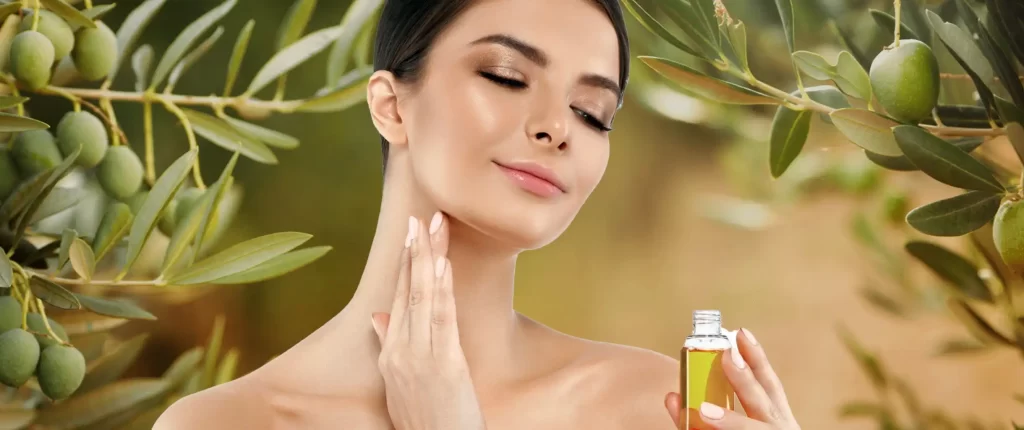
Applying Olive Oil
- Warm the Oil: Take a few drops of olive oil into the palm of your hand. Rub your hands together to warm the oil slightly, which helps it absorb better into the skin.
- Apply Gently: Using your fingertips, apply the olive oil to your face in a circular motion. Start from the center and work outwards, ensuring even coverage without pulling or stretching the skin.
- Focus on Problem Areas: If you have dry patches or wrinkles, spend extra time massaging olive oil into these areas. The massage helps stimulate blood flow and enhances the skin’s elasticity.
- Leave to Absorb: Allow the olive oil to absorb for at least 15 minutes or leave it on overnight for an intensive moisturizing treatment. For daytime use, you might prefer just a light application; too much can leave your skin feeling greasy.
- Rinse or Leave: Depending on your preference and skin type, you can either rinse off the excess oil with warm water and a soft cloth after the treatment or leave it on to continue benefiting from its moisturizing properties.
Using olive oil as part of your skin care routine can help rejuvenate and restore a youthful glow to your skin, making it look softer and smoother.
Other Natural Oils for Skin Care
While olive oil is a fantastic choice for many skin care routines, other natural oils also offer unique benefits and may be better suited to different skin types. Here’s a comparison of olive oil with two other popular oils—coconut oil and argan oil—and recommendations on which oil works best for each skin type.
Olive Oil vs. Coconut Oil vs. Argan Oil
- Olive Oil: As discussed, olive oil is rich in antioxidants and vitamins E and K. It is deeply moisturizing and has anti-inflammatory properties, making it ideal for dry and sensitive skin types. It also helps improve skin elasticity and reduces signs of aging.
- Coconut Oil: Coconut oil is known for its high lauric acid content, which has antimicrobial properties, making it beneficial for combating acne-causing bacteria. It’s a heavier oil, which is great for deeper moisturization. Coconut oil is best suited for dry skin but may be too heavy for those with oily skin as it can clog pores.
- Argan Oil: Argan oil is lighter than olive and coconut oils and is packed with omega fatty acids, vitamin E, and linoleic acids. It helps to moisturize effectively without leaving a greasy residue, making it suitable for most skin types, including oily and combination skin. Its anti-aging properties also help reduce the appearance of wrinkles.
Best Oils for Different Skin Types
- Dry Skin: Both olive oil and coconut oil are excellent for dry skin. Olive oil is better for those with very sensitive skin, while coconut oil is ideal for those needing extra hydration.
- Oily Skin: Argan oil is the best choice for oily skin due to its light texture and non-comedogenic properties, meaning it won’t clog pores.
- Combination Skin: Argan oil works well as it can hydrate dry areas without exacerbating oiliness in other parts.
- Sensitive Skin: Olive oil is highly recommended for sensitive skin because of its natural anti-inflammatory properties and gentle effect on the skin.
- Mature Skin: Olive oil and argan oil are both excellent for mature skin. Olive oil helps with elasticity, while argan oil provides a youthful sheen without heavy residue.
Incorporating the right natural oil into your skin care routine can significantly enhance your skin’s health and appearance, tailored to your specific skin type needs.
Daily Skin Care Routines
Establishing a daily skin care routine is essential for maintaining healthy, vibrant skin. Incorporating olive oil into your regimen can significantly enhance the nourishment and protection of your skin. Here’s how to create an effective daily skin care routine using olive oil, and why consistency is key to seeing results.
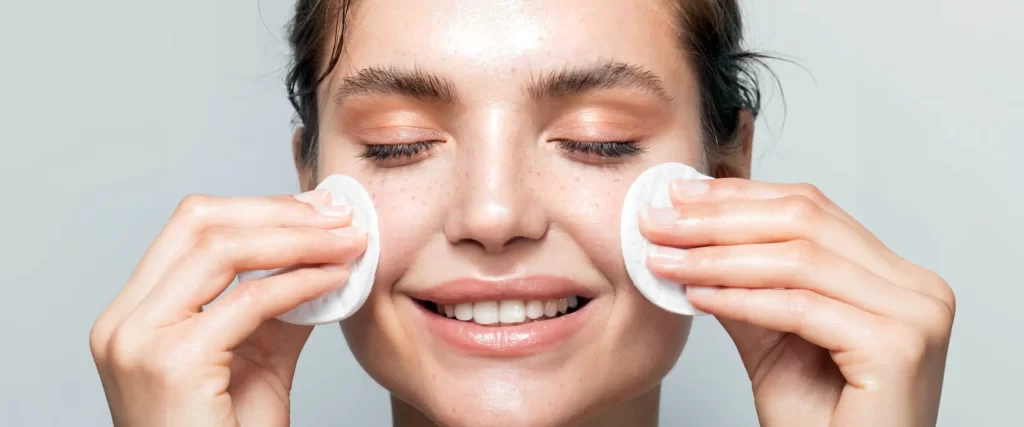
Creating a Daily Regimen with Olive Oil
- Morning Routine:
- Cleanse: Start with a gentle cleanser to remove overnight oils and prepare your skin for other products.
- Tone: Apply a toner to help restore your skin’s pH balance.
- Moisturize: Use a few drops of olive oil mixed with your regular moisturizer for added hydration. Olive oil is particularly effective in locking in moisture without clogging pores.
- Sun Protection: Finish with a broad-spectrum sunscreen to protect against UV damage.
- Evening Routine:
- Remove Makeup: If you wear makeup, use olive oil as a natural makeup remover. It’s effective even on waterproof products.
- Cleanse: Wash your face to remove makeup and environmental pollutants.
- Exfoliate (2-3 times a week): Use a gentle exfoliator to remove dead skin cells, enhancing olive oil absorption.
- Moisturize: Before bed, apply a layer of olive oil to help repair and rejuvenate your skin overnight. The antioxidants in olive oil work well during the skin’s natural renewal process.
Importance of Consistency in Skin Care
To see noticeable improvements in skin health and appearance, consistency is crucial. A daily routine helps:
- Maintain skin balance: Regular use of skin care products, like olive oil, helps keep your skin hydrated, protected, and nourished.
- Prevent skin issues: Consistent care can prevent problems like dryness, acne, and signs of aging.
- Enhance effectiveness: Regular application allows active ingredients in skin care products, including antioxidants in olive oil, to accumulate and maintain their benefits.
Adhering to a routine both morning and night ensures that your skin receives the full benefits of olive oil and other skin care products, leading to healthier, more radiant skin over time.
Advanced Skin Care Techniques
Elevating your skin care routine with advanced techniques such as serums, masks, and scrubs can provide deeper nourishment and address specific skin concerns more effectively. Here’s how you can incorporate these elements into your regimen, along with some DIY recipes to create your own skin care products at home.
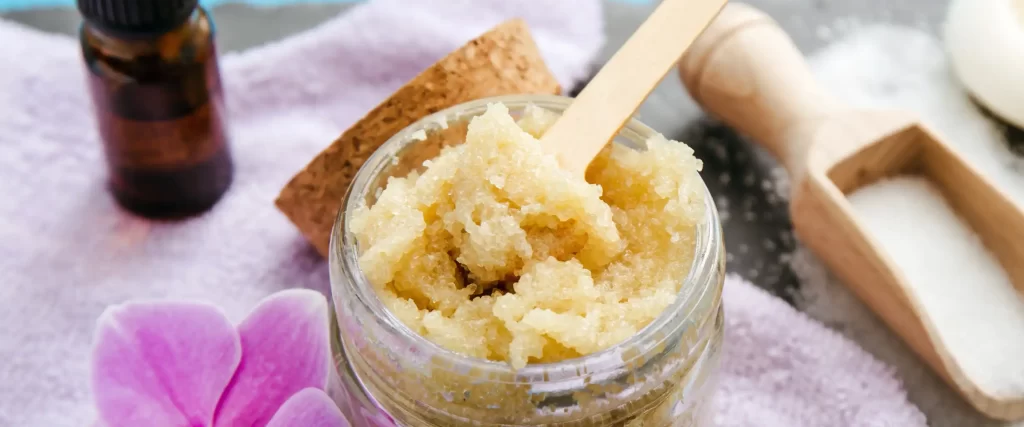
Incorporating Serums, Masks, and Scrubs
- Serums:
- Purpose: Serums are concentrated formulations designed to target specific issues like aging, hydration, or pigmentation.
- Application: Apply a serum after cleansing but before moisturizing to allow the concentrated ingredients to penetrate deeply.
- Olive Oil-Based Serum: For a DIY option, mix olive oil with ingredients like vitamin C powder and essential oils suited for your skin type to create a potent anti-aging serum.
- Masks:
- Purpose: Masks provide intensive treatment and relaxation to the skin. They can hydrate, remove excess oils, and improve the appearance of pores.
- Application: Use a mask once or twice a week, following cleansing. Leave on for the recommended time, then rinse off.
- Olive Oil Hydration Mask: Mix olive oil with natural yogurt and honey for a moisturizing mask. Apply to the face, leave for 15 minutes, then rinse with warm water.
- Scrubs:
- Purpose: Scrubs remove dead skin cells and promote a healthy glow by enhancing blood circulation.
- Application: Scrub your skin gently once a week to avoid over-exfoliation, which can lead to skin barrier damage.
- Olive Oil Sugar Scrub: Combine olive oil with brown sugar and a drop of lavender essential oil for a soothing and exfoliating scrub.
DIY Recipes for Homemade Skin Care Products
- Brightening Serum: Mix 1 tablespoon of olive oil with ½ teaspoon of turmeric and a few drops of lemon juice for a brightening effect. Apply at night to avoid sun sensitivity due to lemon.
- Anti-Acne Mask: Create a paste of olive oil, green clay, and tea tree oil to combat acne. The clay draws out impurities while tea tree oil provides antibacterial properties.
- Revitalizing Scrub: Blend olive oil with ground coffee and coarse sea salt for a stimulating scrub that can help reduce the appearance of cellulite and improve skin texture.
Using these advanced techniques can significantly enhance your skin care routine, providing targeted treatments and the benefits of homemade, natural products.
Lifestyle Tips for Better Skin
Achieving radiant and healthy skin isn’t just about what you apply externally; it’s equally influenced by your lifestyle choices. Here’s how diet, hydration, sleep, and environmental factors play a pivotal role in maintaining your skin’s health, and what you can do to improve these areas.
Diet, Hydration, and Sleep
- Diet:
- What to Eat: Consume foods rich in antioxidants, such as berries, nuts, and green vegetables. These foods help combat oxidative stress that can accelerate aging in the skin.
- Olive Oil: Incorporate olive oil into your diet. Its healthy fats and antioxidants are beneficial for skin health, promoting a smoother, more radiant complexion.
- Hydration:
- Water Intake: Drinking sufficient water daily ensures that your skin remains hydrated from the inside out, reducing the appearance of fine lines and wrinkles. Aim for at least 8 glasses a day.
- Hydrating Foods: Include water-rich foods like cucumbers, oranges, and watermelon in your diet.
- Sleep:
- Importance of Sleep: Adequate sleep (7-9 hours per night) allows your skin to repair and renew itself. Sleep deprivation can lead to increased stress hormones, which may exacerbate skin conditions like acne.
- Sleep Environment: Ensure your sleeping environment is conducive to good sleep—dark, cool, and quiet.
Environmental Factors Affecting Skin Condition
- Sun Exposure:
- Protection: Protect your skin by applying sunscreen with at least SPF 30. Wear protective clothing and seek shade during peak sun hours.
- Effects of UV Rays: Prolonged sun exposure without protection can lead to photoaging, including wrinkles, loss of elasticity, and pigmented spots.
- Pollution:
- Impact: High levels of pollutants can accelerate skin aging by breaking down collagen and oxidizing the skin surface.
- Protective Measures: Use antioxidants in your skin care routine, such as serums with vitamins C and E, to combat the effects of pollution.
- Climate:
- Dry Air: In dry climates, use a humidifier to maintain indoor humidity levels, helping your skin stay hydrated.
- Cold Weather: Cold weather can be harsh on your skin. Opt for richer moisturizers and protect your skin with appropriate clothing.
By integrating these lifestyle tips into your daily routine, you can enhance your skin care efforts, ensuring your skin remains healthy and vibrant despite the challenges posed by environmental factors and personal habits.
Professional Skin Care Treatments
While a good home skin care routine is vital, certain skin issues or goals might require professional help. Here’s when to consider seeing a dermatologist or esthetician and the types of professional skin care treatments available.
When to Consider Professional Help
- Persistent Skin Issues: If you’re dealing with persistent acne, eczema, rosacea, or other skin conditions that don’t improve with over-the-counter products, it’s time to seek professional advice.
- Severe Skin Damage: For significant issues like deep wrinkles, sun damage, or scarring, professional treatments can offer more dramatic and faster results than home care.
- Expert Guidance: Sometimes, you may need a professional to assess your skin type and condition, recommend products, and create a tailored skin care regimen.
Types of Treatments Available
Professional skin care treatments can vary widely depending on your needs and goals:
- Chemical Peels:
- Purpose: These treatments use a chemical solution to remove the top layers of skin, revealing more youthful skin underneath.
- Benefits: Effective for treating wrinkles, discolored skin, and scars.
- Laser Treatments:
- Types: Including fractional lasers, IPL (Intense Pulsed Light), and laser resurfacing.
- Benefits: These can address a variety of issues, from reducing the appearance of fine lines and sun spots to improving overall skin tone and texture.
- Microdermabrasion:
- Purpose: This is a minimally invasive procedure that uses a special applicator with an abrasive surface to gently sand away the thick outer layer of the skin.
- Benefits: Helps thicken your collagen, which results in a younger looking complexion.
- Botox and Fillers:
- Purpose: Injectables that can help reduce the appearance of lines and wrinkles and restore facial volume.
- Benefits: Immediate results in terms of smoothed out wrinkles and plumper skin areas.
- Professional Facials:
- Purpose: Deep-cleansing treatments tailored to your skin’s needs.
- Benefits: Includes exfoliation, moisturization, and possibly extractions to improve skin health and appearance.
Choosing the right treatment depends on your specific skin issues and desired outcomes. It’s important to consult with a qualified skin care professional who can recommend the most effective treatments based on your individual needs.
Common Skin Problems and Solutions
Common skin concerns such as acne, wrinkles, and dark spots can affect anyone, regardless of age or skin type. Understanding these issues and knowing how to address them—particularly with natural remedies like olive oil—can enhance your skin care routine. Here’s a look at these common problems and how olive oil can be part of the solution.

Acne
Causes: Acne is primarily caused by clogged pores, which can result from excess oil production, dead skin cells, or bacteria buildup.
Olive Oil Solution: While it might seem counterintuitive to apply oil to acne-prone skin, olive oil contains antioxidants and anti-inflammatory properties that can help reduce redness and swelling. It’s important to use it correctly—sparingly and in conjunction with other acne treatments.
Wrinkles
Causes: Wrinkles are typically a result of aging, sun damage, and decreased collagen production in the skin.
Olive Oil Solution: Olive oil is rich in vitamins E and K, which can help combat skin aging by hydrating the skin and improving its elasticity. Applying olive oil regularly can help to moisturize the skin deeply, reducing the appearance of wrinkles over time.
Dark Spots
Causes: Dark spots, or hyperpigmentation, can be caused by factors such as sun exposure, hormonal changes, and aging.
Olive Oil Solution: Olive oil has skin-nourishing fats and is rich in antioxidants, which can help lighten dark spots by promoting skin renewal. Regular massages with olive oil can improve circulation, contributing to skin brightness and reducing the appearance of dark spots.
How to Incorporate Olive Oil for These Concerns
- As a Moisturizer: After cleansing, apply a thin layer of olive oil to damp skin. This locks in moisture and delivers its beneficial antioxidants directly where they are needed.
- In a Face Mask: Combine olive oil with ingredients like lemon juice for dark spots, honey for acne, or mashed banana for wrinkles. Apply these masks 1-2 times a week for targeted treatments.
- For Spot Treatment: Dab a small amount of olive oil directly onto acne blemishes or dark spots nightly, using it to gently moisturize and treat specific areas.
Adopting olive oil as part of your skin care strategy can offer a natural, effective way to combat common skin issues, contributing to healthier, more resilient skin.
Frequently Asked Questions About Olive Oil and Skin Care
Olive oil is a popular ingredient in both cooking and skin care routines, but its use can raise questions about effectiveness, benefits, and proper application. Here are some common questions answered to help clarify how best to use olive oil for skin care.
1. Can olive oil be used on all skin types?
Answer: Olive oil is generally safe for all skin types, but it is especially beneficial for dry and sensitive skin due to its moisturizing and anti-inflammatory properties. Those with oily or acne-prone skin should use it sparingly, as it can clog pores if overused.
2. How does olive oil benefit the skin?
Answer: Olive oil is rich in antioxidants like vitamins E and K, which help protect the skin from environmental damage and promote skin repair and hydration. Its antioxidants can also help prevent premature aging.
3. Is olive oil a good makeup remover?
Answer: Yes, olive oil can effectively remove makeup, even waterproof mascara. It dissolves makeup without stripping the skin of its natural oils, making it a gentle alternative to commercial makeup removers.
4. Can olive oil cause breakouts?
Answer: While olive oil itself does not cause acne, it can exacerbate existing acne if used excessively on oily skin. It’s best to patch test and use non-comedogenic oils if you are prone to breakouts.
5. How often should I use olive oil in my skin care routine?
Answer: This depends on your skin type. Dry and mature skin can benefit from daily use, either as a moisturizer or added to a moisturizer. For oily and combination skin, consider using it less frequently or only on dry areas.
6. Are there any risks to using olive oil on the face?
Answer: Pure olive oil is generally safe for topical use. However, those with a known allergy to olives should avoid it. Always test a small area first to ensure there is no sensitivity or adverse reaction.
7. What type of olive oil is best for skin care?
Answer: For best results, use high-quality, extra-virgin olive oil, as it undergoes less processing and retains more of its natural vitamins and antioxidants.
Conclusion and Key Takeaways
Incorporating olive oil into your skin care routine offers a myriad of benefits, from intense hydration to improved skin elasticity and protection against environmental damage. Here’s a recap of the key takeaways and an encouragement to embrace this natural remedy.
Recap of Olive Oil Benefits in Skin Care:
- Hydration: Olive oil is an excellent moisturizer that deeply penetrates the skin to provide lasting hydration, making it particularly beneficial for dry and mature skin types.
- Antioxidant Protection: With its rich content of antioxidants, including vitamins E and K, olive oil helps to combat the signs of aging by neutralizing free radicals and repairing skin damage.
- Anti-inflammatory Properties: Olive oil can soothe inflammation and redness, making it a great option for sensitive skin and conditions like eczema.
- Natural and Safe: As a natural ingredient, olive oil is safe for most skin types and does not contain harmful chemicals or additives found in some commercial skin care products.
Encouragement to Start a Natural Olive Oil-Based Skin Care Routine:
Embracing an olive oil-based skin care routine is not just about following a trend—it’s about choosing a healthier, more sustainable approach to beauty. Olive oil is versatile and can be used in various ways, whether as a cleanser, moisturizer, or part of a rejuvenating mask.
Starting with small steps, such as integrating olive oil into your routine a few times a week, can help you gauge its effects on your skin. From there, you can adjust how often you use it based on your skin’s needs and responses. Remember, the best results come from consistency and patience, so give your skin ample time to adjust and reap the benefits.
Ressources
Verywell Health – Offers comprehensive information on the benefits and risks of using olive oil in skin care routines. Visit Verywell Health
The Derm Spot – Provides insights into different types of olive oil and how to select the best one for your skin type. Visit The Derm Spot
mindbodygreen – Features advice from dermatologists on the uses and benefits of olive oil for the skin, including DIY recipes. Visit mindbodygreen
Simple Pure Beauty – Discusses olive oil benefits for skin and includes where to buy and DIY recipes. Visit Simple Pure Beauty

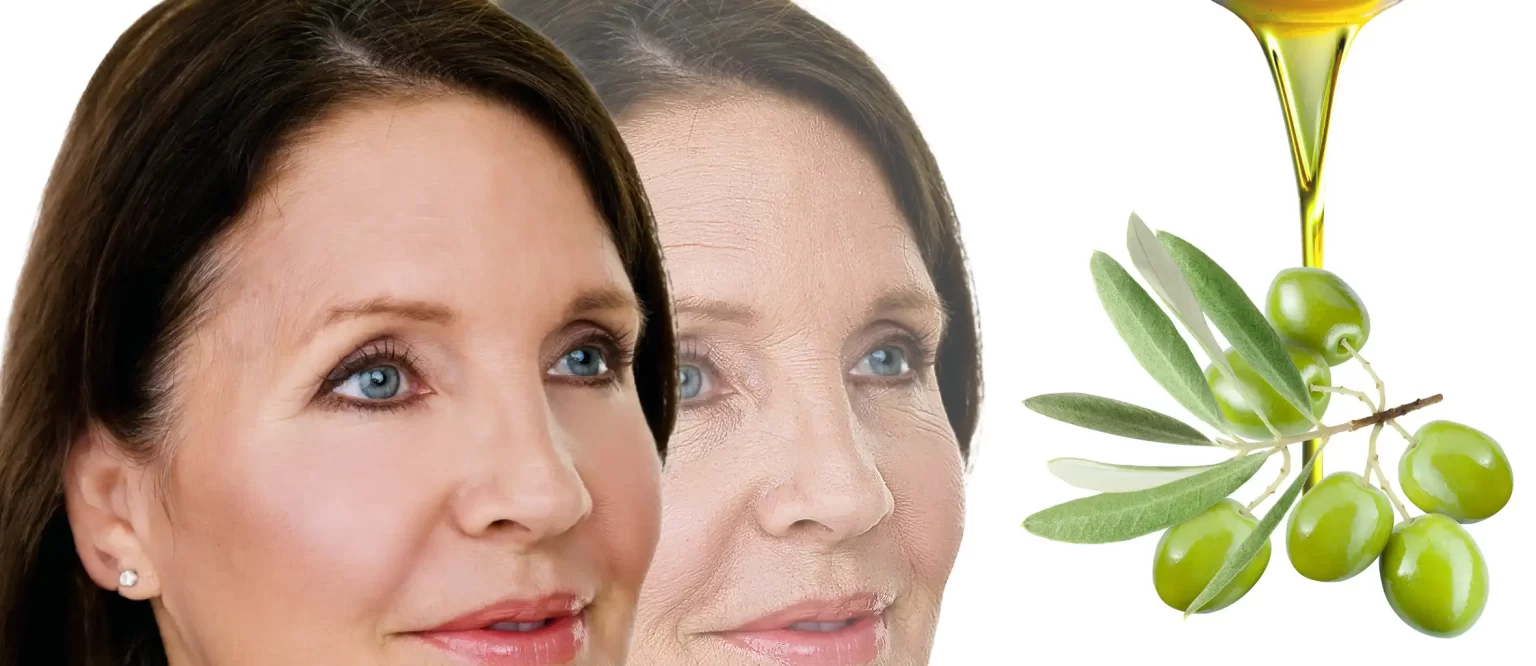
0 thoughts on “The Ultimate Guide to Rejuvenating Your Skin: Olive Oil as Your Secret Weapon”